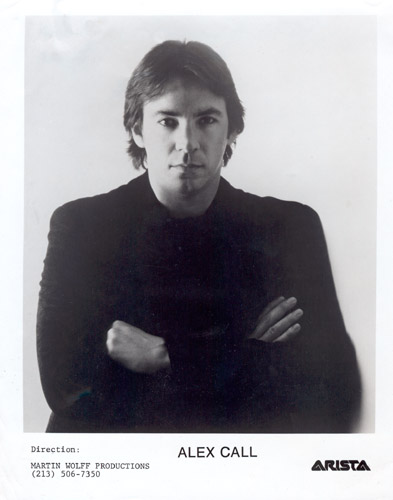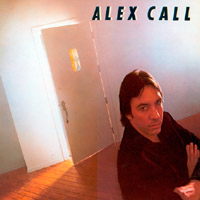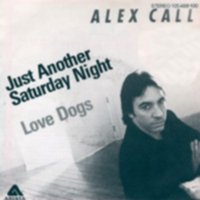BIOGRAPHY
ARISTA RECORDS INC.
Arista Building
6 West 57 Street. New York. N.Y. 10019 Alex Call
Less than a year ago, Alex Call was working a construction job in Marin County, lugging buckets of gravel in the rain. What enabled him to leave the world of manual labor and return full-time to a career in music was the fact that a tune he co-authored, "867-5309/Jenny," had become a huge hit single as performed by Tommy Tutone. The song, in additon of prank telephone calls (no pun intended) since the Marvellettes' "Beechwood 4-5789": some places reported up to 10,000 dialings a day, and one junior high school with that number was given a plaque by CBS Records for putting up with the inconvenience. His songwriting career thus sparked, Call was then ready to return to a recording career that had been interrupted when his band, Clover, broke up in 1978. Call's new album, his first as a solo artist, reveals a remarkable composing and stylistic range, from unblinking reportage of some grizzly evets ("Just Another Saturday Night") to sprightly pop-rock ("Annie Don't Lie," "New Romeo") and some straight-forward love songs ("Hung Over You," "There Goes Another Fool In Love"). Produced with clarity and punch by Ron Nevison, Alex Call bristles with talent. |
 |
To anyone familiar with Call's work as a lead singer, primary composer, and guitarist with Clover, the achievement of Call's LP should come as no surprise. Formed in the San Francisco Bay Area at the height of that city's rock renaissance (1967), Clover recorded two albums for Fantasy Records (Clover and 49er). At one of their local dates (at the Palomino) they were visited by Brinsley Schwarz's Nick Lowe, who led them to managerial entrepreneurs Jake Rivera and Dave Robinson, and then to England. By this time the ranks of Clover had been increased by the additon of harmonica player/singer Huey Lewis, and the expanded line-up cut two albums for Phonogram (Mercury in the U.S.) with producer Robert John "Mutt" Lange: Clover and Love On The Wire. Among Clover's other assignments while overseas were appearing on an album by Twiggy (which featured the first cover versions of a Call song, "I Lie Awake And Dream Of You"), and backing Elvis Costello on the My Aim Is True album. Tours throughout Great Britain and Europe found them playing on bills with Thin Lizzy, Lynyrd Skynyrd, and Graham Parker and The Rumour.
If Clover's eclectic approach -- they would, Call states, go from James Brown to Merle Haggard songs in the space of a few minutes -- denied them an audience, their divergent musical goals and styles helped to split apart the band. McFee took his guitar to The Doobie Brothers, Lewis and keyboardist Sean Hopper eventually became the nucleus of Huey Lewis and The News, and Call began to concentrate more on songwriting. Two of his songs ("Love Is Gone" and "Mr. Moon") were recorded by Carlene Carter on her debut album with The Rumour (whose members included Brinsley Schwarz musicians), and Tim Goodman did "New Romeo" (Call does it on his own album). Moste recently, Pat Benatar cut Call's "Little Too Late," which was released as a single.
Although he kept his performing to a minimum, doing some dates with a band called The Love Dogs, Call did, after Tutone's "867-5309/Jenny" hit, cut a demo with the idea of securing a recording deal. Arista signed him in mid-1982, and Call went into the studio to record ten original songs. The track that will probably get the most immediate attention is "Just Another Saturday Night" (a.k.a. "High School Killing"), depicting two true-life California dramas. In one, a pair of brothers go out cruising in San Francisco an get into a run-in with a gang, and one of the brothers is shot and murdered. The other incident on which the song is based took place in San Jose: a 15 year old boy killed his parents, hoping to inherit the insurance money so he could buy a Trans-Am. Call who wrote the song on a "tranquil spring day," doesn't sensationalize the killings, but makes the events searingly vivid. That same attention to detail marks all of Call's work, regardless of the subject matter; his attitude toward songwriting is perhaps best expressed on his own words, from the song "Dark Side Of The Night":
"Sometimes I think that there's a symbol that appears
If we could see it shining above every action that we make
And it's all that I can do to deliver out these stories
As the rising waters come and threaten to wash me away."
***

LP ARISTA 205 393-320 | 
Single ARISTA 105 488-100 |
| © 1996-2015 Clover-Infopage.com |
 |


